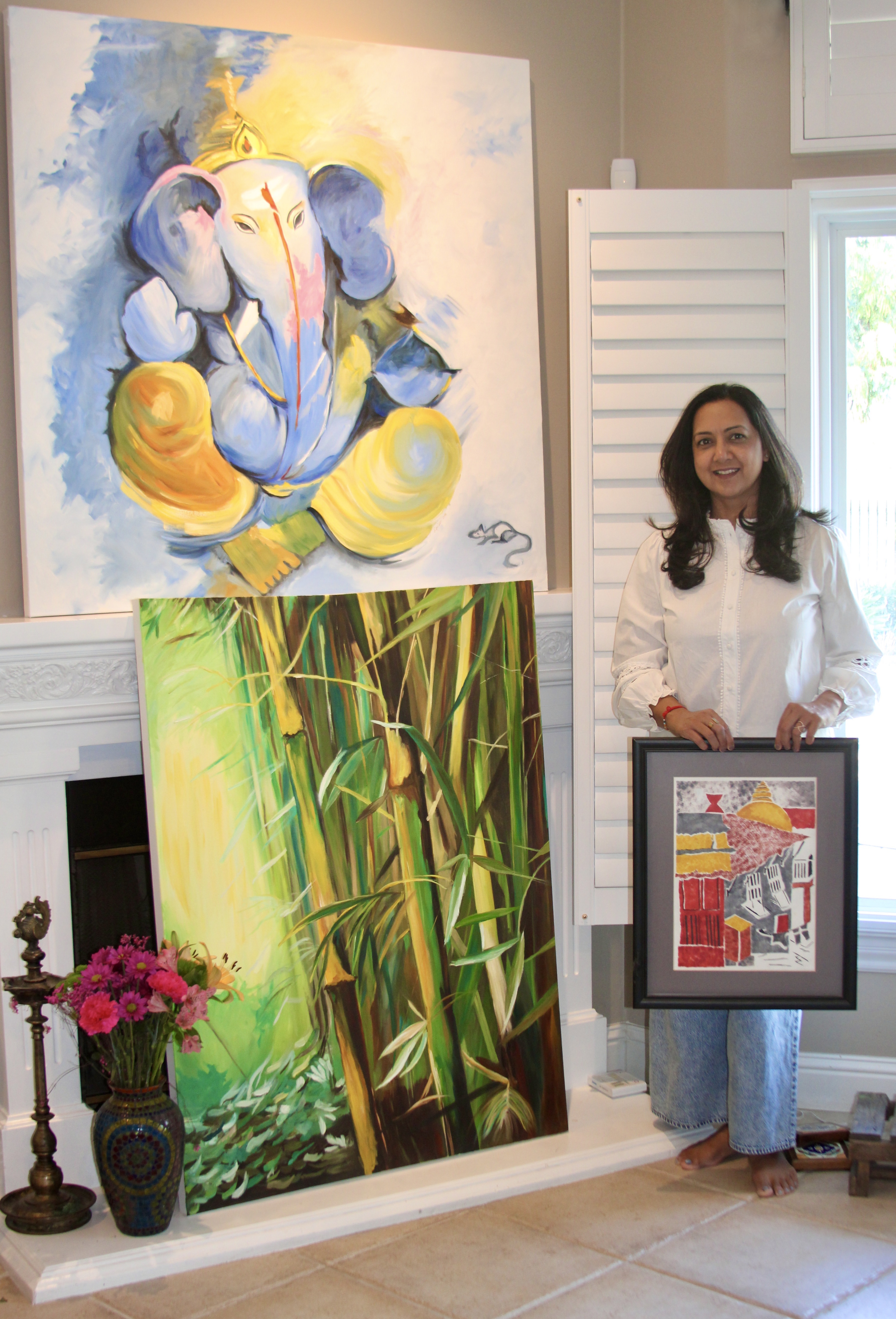Creating More Than Art—Creating Space
Through KalaKari, Dipalee offers not lessons, but liberation: a studio for expression, exploration, and community.

Dipalee and some of her artwork
As I stepped up to the Pandya family’s front door in Seven Oaks, I was immediately drawn to a beautiful hand-painted design at my feet, just before the welcome mat. Above it, a small sign asked visitors to kindly remove their shoes. The message was clear: you’re entering a space that blends cultural tradition with personal warmth.
The intricate artwork is Rangoli, a centuries-old Indian tradition that uses vivid patterns to welcome guests and invoke blessings. Created annually in October for Diwali, India’s Festival of Lights, Dipalee Pandya paints her Rangoli with reverence and joy. “It’s part of my heritage,” she shared. “We do it to invite prosperity and good fortune into the home. For me, it’s also a grounding ritual, one that connects my past with my present.”
Each year, during Diwali, she refreshes the design, allowing it to evolve while still honoring the symbolism. It’s a moment that reflects the essence of her journey: colorful, rooted, and reimagined.
Much like the Rangoli at her door, Dipalee’s story is one of blending tradition with transformation. Originally from Ahmedabad, a culturally rich city in Gujarat, India, a vibrant Indian city known for its rich culture, textiles, and as the birthplace of Mahatma Gandhi. Dipalee moved to the U.S. in 2003 after getting married. She first lived near Chicago, then relocated to Bakersfield, a city she initially struggled to connect with.
“I came from a place full of art, textile markets, and rich history. Here, it felt quiet. But over time, I started to see the beauty in the simplicity,” she said. “It’s an easier life in many ways, especially for raising a family.”
A trained graphic designer with roots in fine art, Dipalee always had a creative spirit. But like many in traditional Indian families, she was encouraged to pursue a more “practical” path. “I was painting at 14,” she said, “but I studied a bachelor’s in commerce, because that’s what was expected.”
Eventually, she returned to art school at Columbia College in Chicago and worked in animation and advertising. But motherhood pressed pause on her career. For nearly a decade, art became something private, stolen moments between raising children and managing a household.
“I’d go months without touching a brush,” she said. “And then suddenly, I’d be painting for two days straight, lost in it. It’s how I process emotions, it’s therapeutic.”
Inside her home, that emotional depth is visible in every corner. One of the most striking visuals is a beautiful painting of Ganesha, a Hindu deity known as the remover of obstacles. His form is brought to life through colorful, fluid brushstrokes and a palette that seems to pulse with energy. The moment I saw it, I was instinctively drawn in, not just by the sheer beauty of the colors but by the quiet strength and serenity it exudes. It felt less like a painting and more like a presence, protective, joyful, and deeply personal.
“Ganesha represents beginnings,” she said. “We always start anything important by invoking him.” At the base of the painting is a small mouse, Ganesha’s unlikely companion. “The mouse symbolizes desire and ego,” she explained. “The idea is to ride them, not be ruled by them.”
Now that her children are older, Dipalee is channeling her full energy into something new: KalaKari.
“‘Kala’ means art in Sanskrit. ‘Kari’ means the one who creates,” she said. “So KalaKari is about becoming the creator through art.”
Dipalee is not setting up a traditional art school. Her vision is something deeper: an intimate space where people can reconnect with creativity, emotion, and community. “I don’t want to teach step-by-step lessons,” she said. “I want to offer an environment where people feel free to express, explore, and heal through art.”
These small-group sessions will be held in her newly carved-out home studio, focusing on mixed media techniques, intuitive creativity, and mindful expression. She is also hoping to find the perfect studio space. A space to create, to grow, and to connect with one another in a place where they can be with like-minded souls.
“Everyone has an artist within them,” Dipalee said. “You just need the space to discover it. You don’t need to be ‘wounded’ to heal through art. We all benefit from it, it’s human.”
This fall, Dipalee’s work will also be featured in the Art2Heal4Hue coloring book, a community art project celebrating healing through creativity. You can find the fall edition and more information at Art2Heal4Hue.com, or follow the project on Facebook and Instagram @Art2Heal4Hue. The newest location to purchase books is at Covenant Coffee on N. Chester and The Stockdale Tower. Follow Dipalee @KalaKariTheArtStudio.
With her warm, grounded presence and rich creative history, Dipalee Pandya has transformed her home into more than a place of residence. It’s a space of meaning. Her Rangoli isn’t just decoration, it’s a declaration of welcome. Her Ganesha isn’t just symbolic; it’s a spiritual compass. And KalaKari isn’t just a name, it’s her mission.
What started as a quiet chapter in Bakersfield has grown into something expansive, beautiful, and entirely her own. “This is my Ahmedabad now,” she said. “When I go back to India, it feels new. Because this is home, here in Seven Oaks.”
And from the moment you step onto her painted threshold, you can feel it too.